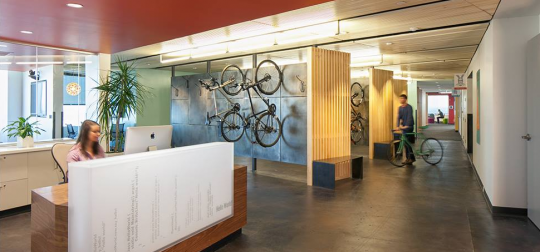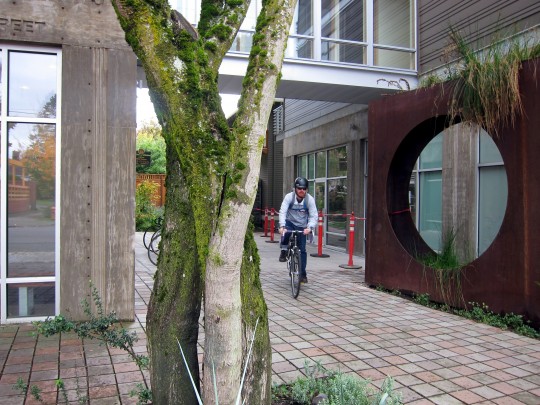
(Photo: New Relic)
Got a new job in Portland? Have a new bike.
Deals like that could become common under a set of proposed rules being discussed by the City of Portland that might require developers or property managers to give each new resident or on-site worker $600 that could be spent only on non-car transportation: a nice new bike, six months of TriMet passes, four years of bike share memberships, or whatever.
The one-time payment would trigger at the time of move-in or hire. The goal is to make Portland’s streets cleaner and more efficient by reducing auto use.
Subsidizing certain transportation choices is nothing new in Portland real estate. That’s exactly what the city has been doing for decades by requiring almost every new building to have minimum amounts of on-site auto parking, whether or not the residents or employees will use it.
The main difference is that at $17,000 per stall, an auto parking space is much, much more expensive than a new bike.
Either way, of course, tenants of a building ultimately pay for its amenities (be they “free” bikes, “free” bus rides, “free” parking or anything else) in their rent.
Modeled after other cities

(Photo: M. Andersen/BikePortland)
Peter Hurley, a senior policy planner for the city transportation bureau, said the proposal is modeled on similar requirements in Berkeley, California; Boulder, Colorado; Contra Costa County, California; Pasadena, California; Redmond, Washington; Rockville, Maryland; Santa Monica, California; and Arlington County, Virginia.
We’re creating more reasons for people not to have to have a car.”
— Portland Transportation Policy Planner Peter Hurley
Those programs range from a one-time $70 payment per occupant (in Arlington County) to $110 per month per occupant for the life of the building (Santa Monica).
Portland’s proposed rule falls on the lower side of that spectrum. But most U.S. cities (Seattle, San Francisco and Spokane were among those the city surveyed) don’t have programs that apply to new residential buildings or small employers.
“The idea is that we’re creating more reasons for people not to have to have a car, and not to use it if they do” have one, Hurley said Monday.
Hurley said that as the city tries to get drive-alone trips down from about 60 percent of its residents’ transportation to about 30 percent by 2030, two factors are calculated to have the highest payoff: better bike infrastructure and a “transportation demand management” program like this one.
He said Portland needs to be pursuing both.
Another possible rule: No car? No parking costs

(Photo: J. Maus/BikePortland)
The concept of requiring buildings to pay for bikes or transit passes isn’t the only measure under discussion. The city is also considering requiring some new buildings to “unbundle” parking from rent.
This would let residents and employees who don’t drive to opt out of paying for parking they don’t need.
Or, to look at it from another perspective: it would require people who do drive to pay the full cost of parking on site.
Advertisement
Many central-city employers currently subsidize their employees’ parking garage bills, though not all do. And though most new apartment buildings in inner neighborhoods currently make on-site parking optional, the typical rate of $100 or $120 a month is probably less than the actual cost to the developer, which means that everyone in the building is helping pay for the parking spaces.
If new apartment buildings were required to charge residents the full unsubsidized cost of parking, that’d probably increase the number of people parking cars for free on nearby streets.
That’s where the city’s proposed parking permit system would kick in. If approved as proposed, it would let neighborhoods vote to ban residents of mixed-use zones from parking on nearby single-family blocks overnight.
Many details still up in the air
A lot of things about the city’s proposal remain uncertain.
Most importantly, the city hasn’t decided which buildings, if any, these rules would apply to. Hurley said the city has legal authority to impose these requirements on every building, but is unlikely to do so for existing buildings.
The city hasn’t yet decided which buildings, if any, these rules would apply to.
Hurley called that “a more modest step to get the program up and running.”
That leaves new buildings.
Would the requirements only effect buildings in mixed-use zones? Only in downtown, or maybe in certain inner neighborhoods? Only on buildings where the developer has opted to build on-site auto parking? Only on buildings where the developer has opted to build no on-site auto parking?
Those are all options.
Then there’s the size of the incentive. Is a one-time payment of $600 at the time of hire or move-in too little? Too much?
How strict should the requirements be for what the money can be spent on? Who would oversee the program?
All those questions are to be determined. The city hosted daytime meetings Tuesday and next week to discuss the new rules. If you’d like to share your thoughts, email Hurley’s team: TSP@portlandoregon.gov.
— Michael Andersen, (503) 333-7824 – michael@bikeportland.org
The Real Estate Beat is a regular column. You can sign up to get an email of Real Estate Beat posts (and nothing else) here, or read past installments here.



